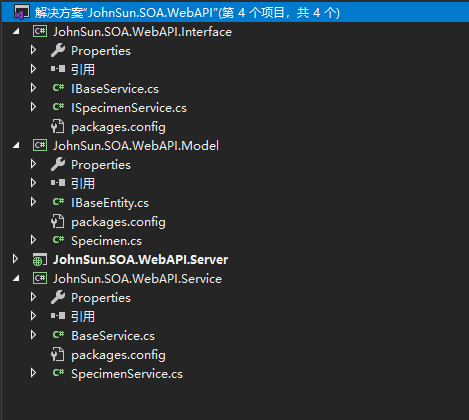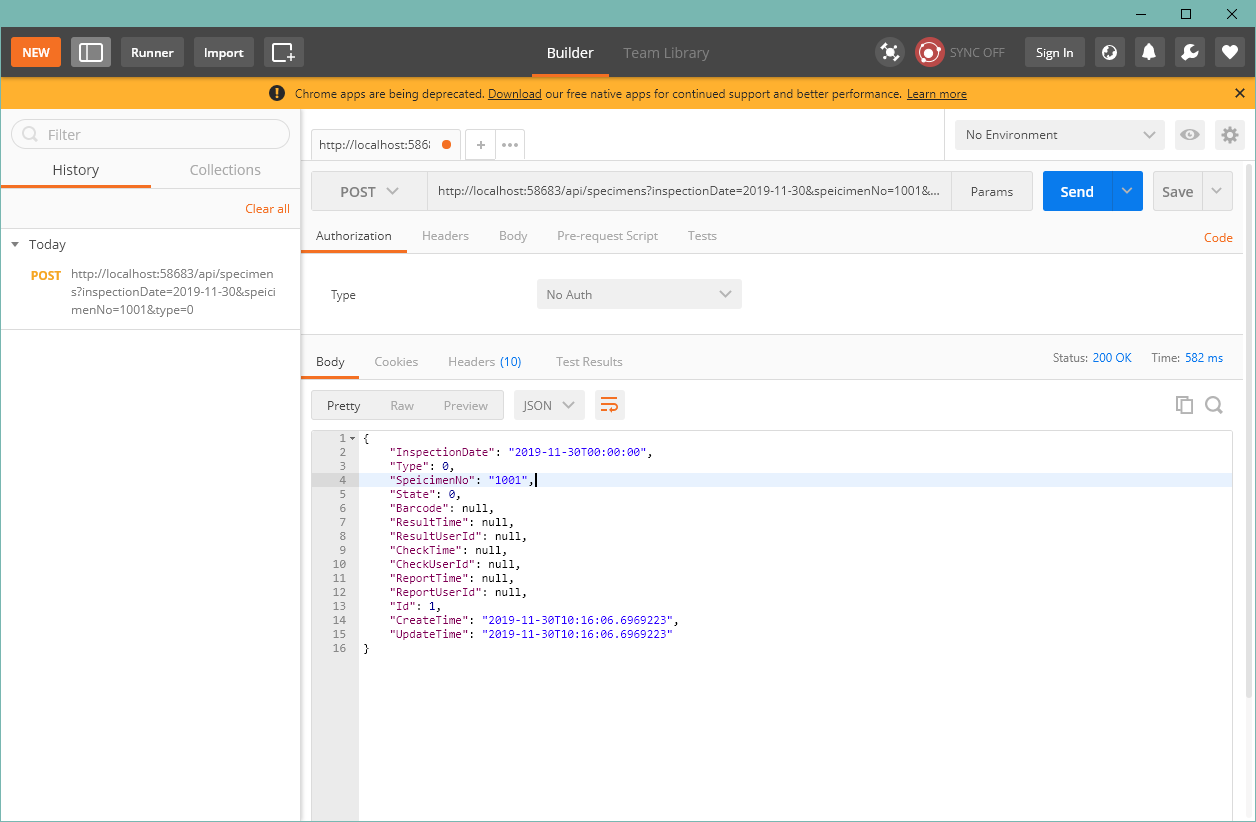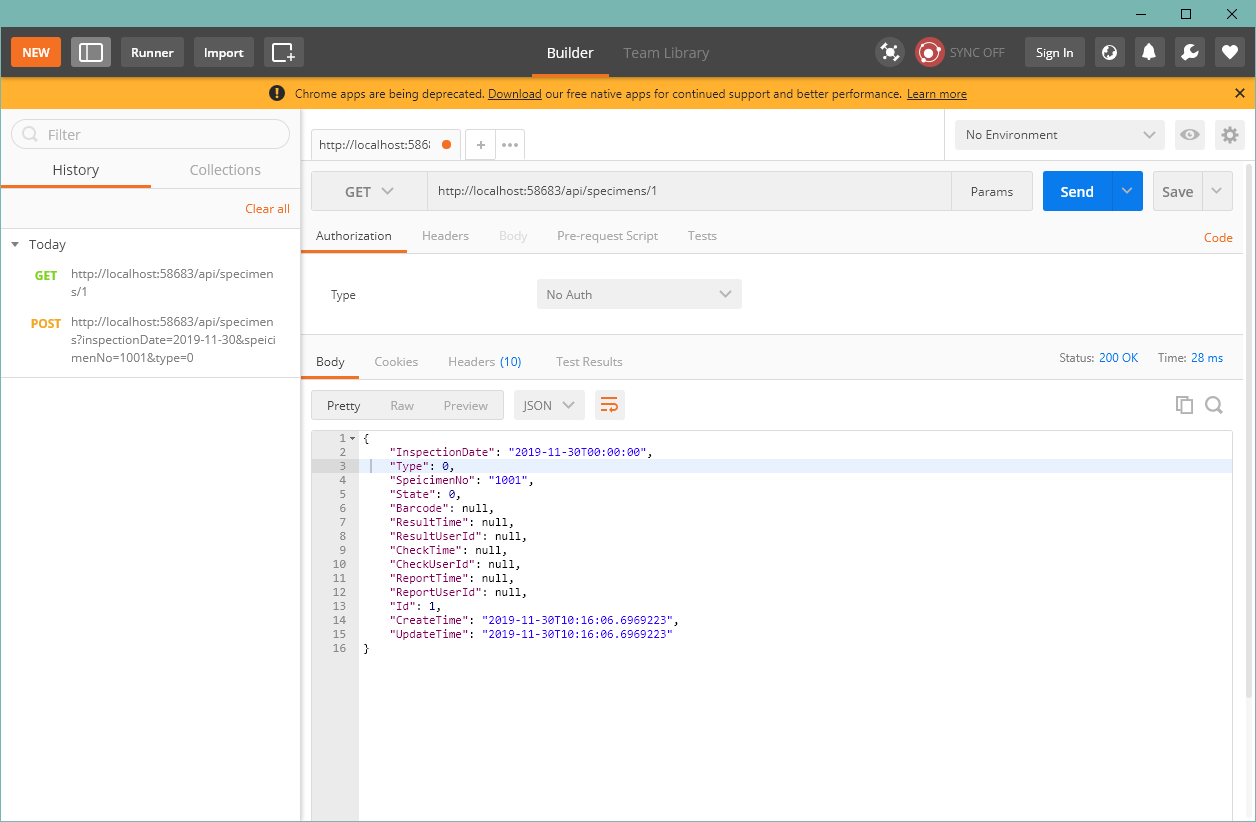
依赖注入(Dependency Injection,缩写DI)是将系统中各层对象解耦的一种方式,是实现控制反转(Inversion of Control,缩写IoC)的一种常用方式。
搭建框架
首先我们搭建一个用于测试的基本框架,因为最近在了解 FreeSql,所以数据访问就使用 FreeSql,在这里推荐一下这个项目,叶老板真的很🐂🍺。
下图可以看出项目的简单架构:

实体
实体层定义了实体的接口 IBaseEntity :
public class IBaseEntity
{
[Column(IsPrimary = true, IsIdentity = true)]
public long Id { get; set; }
public DateTime CreateTime { get; set; } = DateTime.Now;
public DateTime UpdateTime { get; set; } = DateTime.Now;
}
标本类 Specimen:
public class Specimen : IBaseEntity
{
public DateTime InspectionDate { get; set; }
public int Type { get; set; }
public string SpeicimenNo { get; set; }
public int State { get; set; }
public string Barcode { get; set; }
public DateTime? ResultTime { get; set; }
public int? ResultUserId { get; set; }
public DateTime? CheckTime { get; set; }
public int? CheckUserId { get; set; }
public DateTime? ReportTime { get; set; }
public int? ReportUserId { get; set; }
}
服务接口
服务接口首先定义了服务常用的一些操作 IBaseService:
public interface IBaseService<T> where T : IBaseEntity
{
T Insert(T t);
T Get(int id);
T Update(T t);
bool Delete(int id);
}
然后不同的业务实体,也有自己的业务逻辑 ISpecimenService:
public interface ISpecimenService : IBaseService<Specimen>
{
Specimen CheckSpecimen(int specimenId, int userId);
}
服务实现
服务接口的实现,首先是 IBaseService 的实现 BaseService:
public class BaseService<T> : IBaseService<T> where T : IBaseEntity
{
protected virtual IFreeSql FreeSql { get; set; }
public BaseService(IFreeSql freeSql)
{
FreeSql = freeSql;
}
public virtual bool Delete(int id)
{
return FreeSql.Delete<T>(id).ExecuteAffrows() > 0;
}
public virtual T Get(int id)
{
return FreeSql.Select<T>(id).First();
}
public virtual T Insert(T t)
{
int id = (int)FreeSql.Insert<T>().AppendData(t).ExecuteIdentity();
return FreeSql.Select<T>(id).First();
}
public virtual T Update(T t)
{
t.UpdateTime = DateTime.Now;
int rows = FreeSql.Update<T>(t).ExecuteAffrows();
if (rows == 1)
return FreeSql.Select<T>(t.Id).First();
else
return null;
}
}
ISpecimenService 的实现 SpecimenService:
public class SpecimenService : BaseService<Specimen>, ISpecimenService
{
public SpecimenService(IFreeSql freeSql) : base(freeSql) { }
public Specimen CheckSpecimen(int specimenId, int userId)
{
return FreeSql.Update<Specimen>().Set(s => new { CheckUserId = userId, CheckTime = DateTime.Now }).ExecuteUpdated().First();
}
}
Web 站点
首先是需要创建用于初始化 FreeSql 的工厂 FreeSqlFactory:
public class FreeSqlFactory
{
public static IFreeSql FreeSql { get; private set; }
static FreeSqlFactory()
{
FreeSql = new FreeSql.FreeSqlBuilder()
.UseConnectionString(global::FreeSql.DataType.Sqlite, "Data Source=|DataDirectory|\\data.db;Pooling=true;Max Pool Size=10")
.UseAutoSyncStructure(true)
.Build();
}
}
这里主要是想让该项目简单一些,所以只考虑服务层 JohnSun.SOA.WebAPI.Service 的注入,所以直接将数据库访问层依赖细节,使用 SQLite 数据库,并使用 FreeSql 的 CodeFirst 模式。
然后就创建一个 Web API 控制器 SpecimensController:
public class SpecimensController : ApiController
{
public Specimen Get(int id)
{
SpecimenService service = new SpecimenService(FreeSqlFactory.FreeSql);
return service.Get(id);
}
public Specimen Post(DateTime inspectionDate, string speicimenNo, int type, string barcode = null)
{
SpecimenService service = new SpecimenService(FreeSqlFactory.FreeSql);
return service.Insert(new Specimen { InspectionDate = inspectionDate, SpeicimenNo = speicimenNo, Type = type, Barcode = barcode });
}
}
这里只提供两个简单的方法,一个新增方法,一个通过Id查询数据。
访问测试
截止到目前,一个简单的测试项目创建完成,我们可以使用 postman 对项目进行简单的测试。
首先是调用 POST 方法,新增标本 http://localhost:58683/api/specimens?inspectionDate=2019-11-30&speicimenNo=1001&type=0:

返回的是一个创建成功后的数据库实体,我们可以通过这个对象的 id 再使用 GET 方法进行查询 http://localhost:58683/api/specimens/1:

Unity 实现依赖注入
为了方便理解,我们将移除依赖具体实现的步骤罗列出来,方便对控制反转的实现有一个简单的了解。
使用 Unity 创建对象
首先我们将对象的创建移交给 Unity,首先我们使用 nuget 为 Web 项目添加 Unity 的包引用:
Install-Package Unity -Version 5.11.1
然后我们添加一个统一的依赖注入容器,将需要用到的类型注册到容器中:
IUnityContainer container = new UnityContainer();
// 注册单例 因为 ISpecimenService 的构造函数需要提供一个 IFreeSql 的参数
container.RegisterInstance(FreeSqlFactory.FreeSql);
// 注册 SpecimenService 到 ISpecimenService
container.RegisterType<ISpecimenService, SpecimenService>();
这样我们创建 ISpecimenService 的实例对象就不需要再依赖细节 SpecimenService:
ISpecimenService service = container.Resolve<ISpecimenService>();
调整为工厂
我们并不需要每次初始化 ISpecimenService 都创建一个依赖注入的容器,实际上这个容器只需要创建一次,所以我们增加一个 ContainerFactory 的类型:
public class ContainerFactory
{
public static IUnityContainer Container { get; private set; }
static ContainerFactory()
{
Container = new UnityContainer();
Container.RegisterInstance(FreeSqlFactory.FreeSql);
Container.RegisterType<ISpecimenService, SpecimenService>();
}
}
然后调整我们的控制器 SpecimensController:
public Specimen Get(int id)
{
ISpecimenService service = ContainerFactory.Container.Resolve<ISpecimenService>();
return service.Get(id);
}
public Specimen Post(DateTime inspectionDate, string speicimenNo, int type, string barcode = null)
{
ISpecimenService service = ContainerFactory.Container.Resolve<ISpecimenService>();
return service.Insert(new Specimen { InspectionDate = inspectionDate, SpeicimenNo = speicimenNo, Type = type, Barcode = barcode });
}
调整为使用配置文件
因为 ContainerFactory 工厂类注册时仍然存在 SpecimenService,所以我们要将改类型从上层中移除,否则我们仍然无法指定 ISpecimenService。
Unity 为我们提供了使用配置文件初始化依赖注入容器的方案,所以首先我们移除 Web 对于 JohnSun.SOA.WebAPI.Service 项目的引用,使服务不再强依赖于该项目,方便后期对产品的升级改造。
但是测试项目仍然需要一个实现,所以我们需要在移除依赖后,手动的将 JohnSun.SOA.WebAPI.Service/bin 目录下的文件拷贝到 JohnSun.SOA.WebAPI.Server/bin 下。
添加 Unity.Configuration 的引用:
Install-Package Unity.Configuration -Version 5.11.1
在 Web 项目中添加配置文件 ConfigFiles/Unity.config:
<?xml version="1.0" encoding="utf-8"?>
<configuration>
<configSections>
<section name="unity" type="Microsoft.Practices.Unity.Configuration.UnityConfigurationSection, Unity.Configuration" />
</configSections>
<unity>
<aliases>
<add alias="ISpecimenService" type="JohnSun.SOA.WebAPI.Interface.ISpecimenService, JohnSun.SOA.WebAPI.Interface" />
<add alias="SpecimenService" type="JohnSun.SOA.WebAPI.Service.SpecimenService, JohnSun.SOA.WebAPI.Service" />
</aliases>
<container>
<register type="ISpecimenService" mapTo="SpecimenService" />
</container>
</unity>
</configuration>
调整 ContainerFactory 的静态构造函数代码:
Container = new UnityContainer();
Container.RegisterInstance(FreeSqlFactory.FreeSql);
string configPath = Path.Combine(AppDomain.CurrentDomain.BaseDirectory, @"ConfigFiles\Unity.config");
ExeConfigurationFileMap map = new ExeConfigurationFileMap { ExeConfigFilename = configPath };
Configuration configuration = ConfigurationManager.OpenMappedExeConfiguration(map, ConfigurationUserLevel.None);
UnityConfigurationSection section = (UnityConfigurationSection)configuration.GetSection(UnityConfigurationSection.SectionName);
section.Configure(Container);
这时在 Web 项目中已经不需要依赖 JohnSun.SOA.WebAPI.Service 的任何细节,均可以通过配置文件实现。
注意:
FreeSql 仍然依赖细节,前文已经提到为了测试项目的简单,所以就不要在意细节了。
后面写到这段代码的时候有考虑将FreeSqlFactory.FreeSql移交给配置文件,但是配置文件instance节点在Unity项目中给出的测试用例,无法指定value为一个程序中的字段或属性,value只能设置一些常量值例如字符串或数字。
后面仔细想了一下,如果真的想移除依赖,可能需要增加一个类似IFreeSqlInfo的对象,将IFreeSql作为该类型的一个属性,这样我们还可以提供一个多个参数的构造函数,用来指定连接的数据库、数据库类型、连接字符串、是否启用数据库迁移等等。
当然,最终也要将SpecimenService构造函数中的IFreeSql调整成IFreeSqlInfo的实现才行。
控制器的注入
虽然已经成功添加容器,移除了细节的依赖,但是控制器中我们仍然需要使用 Resolve 构造对象,所以下一步我们需要将 Service 对象的构造也注入进来。
首先我们需要修改控制器的结构,将 SpecimensController 控制器调整为以下代码:
public class SpecimensController : ApiController
{
private readonly ISpecimenService _specimenService;
public SpecimensController(ISpecimenService specimenService)
{
_specimenService = specimenService;
}
public Specimen Get(int id)
{
return _specimenService.Get(id);
}
public Specimen Post(DateTime inspectionDate, string speicimenNo, int type, string barcode = null)
{
return _specimenService.Insert(new Specimen { InspectionDate = inspectionDate, SpeicimenNo = speicimenNo, Type = type, Barcode = barcode });
}
}
这个时候如果直接运行项目肯定是不行的,因为控制器默认无参数的构造函数已经不存在了,会报错。
传统方式注入
根据 MSDN 上的文档,我们可以借助 Web API 定义用于解析依赖项的 IDependencyResolver 接口来实现控制器的注入。
public interface IDependencyResolver : IDependencyScope, IDisposable
{
IDependencyScope BeginScope();
}
public interface IDependencyScope : IDisposable
{
object GetService(Type serviceType);
IEnumerable<object> GetServices(Type serviceType);
}
IDependencyScope 接口有两种方法:
GetService创建一个类型的实例。GetServices创建指定类型的对象的集合。
IDependencyResolver 方法继承 IDependencyScope 并添加 BeginScope 方法。
当 Web API 创建控制器实例时,它将首先调用 IDependencyResolver 的 GetService 方法,并传入控制器类型。我们可以借助该特性,来构造任何控制器,如果 GetService 返回 Null,Web API 将在控制器类上查找无参数的构造函数。
public class UnityResolver : IDependencyResolver
{
protected IUnityContainer container;
public UnityResolver(IUnityContainer container)
{
if (container == null)
{
throw new ArgumentNullException("container");
}
this.container = container;
}
public IDependencyScope BeginScope()
{
return new UnityResolver(container.CreateChildContainer());
}
public void Dispose()
{
Dispose(true);
}
protected virtual void Dispose(bool disposing)
{
container.Dispose();
}
public object GetService(Type serviceType)
{
try
{
return ContainerFactory.Container.Resolve(serviceType);
}
catch (ResolutionFailedException)
{
return null;
}
}
public IEnumerable<object> GetServices(Type serviceType)
{
try
{
return ContainerFactory.Container.ResolveAll(serviceType);
}
catch (ResolutionFailedException)
{
return new List<object>();
}
}
}
最后我们需要将 HttpConfiguration 中的 DependencyResolver 属性替换为我们实现的 UnityResolver。
修改 WebApiConfig.Register 方法,增加以下代码:
config.DependencyResolver = new UnityResolver(ContainerFactory.Container);
使用 Unity.WebAPI
Unity 提供了一个包,方便我们控制器的注入,首先要通过 nuget 安装包:
Install-Package Unity.WebAPI -Version 5.4.0
同之前一样,修改 WebApiConfig.Register 方法,增加以下代码:
config.DependencyResolver = new Unity.WebApi.UnityDependencyResolver(ContainerFactory.Container);
UnityDependencyResolver 类型是帮我们实现的 IDependencyResolver 接口,通过反编译代码可以了解和我们从 MSDN 的常规实现基本一致:
// Unity.WebApi.UnityDependencyScope
using System;
using System.Collections.Generic;
using System.Web.Http.Controllers;
using System.Web.Http.Dependencies;
using Unity;
using Unity.Resolution;
public class UnityDependencyScope : IDependencyScope, IDisposable
{
protected IUnityContainer Container
{
get;
private set;
}
public UnityDependencyScope(IUnityContainer container)
{
Container = container;
}
public object GetService(Type serviceType)
{
if (typeof(IHttpController).IsAssignableFrom(serviceType))
{
return UnityContainerExtensions.Resolve(Container, serviceType, (ResolverOverride[])(object)new ResolverOverride[0]);
}
try
{
return UnityContainerExtensions.Resolve(Container, serviceType, (ResolverOverride[])(object)new ResolverOverride[0]);
}
catch
{
return null;
}
}
public IEnumerable<object> GetServices(Type serviceType)
{
return UnityContainerExtensions.ResolveAll(Container, serviceType, (ResolverOverride[])(object)new ResolverOverride[0]);
}
public void Dispose()
{
((IDisposable)Container).Dispose();
}
}
// Unity.WebApi.UnityDependencyResolver
using System;
using System.Web.Http.Dependencies;
using Unity;
using Unity.WebApi;
public class UnityDependencyResolver : UnityDependencyScope, IDependencyResolver, IDependencyScope, IDisposable
{
public UnityDependencyResolver(IUnityContainer container)
: base(container)
{
}
public IDependencyScope BeginScope()
{
return (IDependencyScope)(object)new UnityDependencyScope(base.Container.CreateChildContainer());
}
}
Autofac 实现依赖注入
相较于 Unity,其实 Autofac 使用更广泛,普遍认为后者的性能表现要优于前者,并且后者拥有中文文档,社区更活跃。
代码中为容器注册类型
本质上 Autofac 与前者差异不大,所以这里只是简单的介绍一下使用,更多的知识可以了解官方的文档。
这里添加一个 AutofacContainerFactory 的类型:
public class AutofacContainerFactory
{
public static IContainer Container { get; private set; }
static AutofacContainerFactory()
{
// Autofac 在程序中注册
var builder = new ContainerBuilder();
builder.RegisterInstance(FreeSqlFactory.FreeSql);
builder.RegisterType<SpecimenService>().As<ISpecimenService>();
Container = builder.Build();
}
}
这时无法运行程序,甚至会报错,因为基于 Unity 的那套代码,Service 的项目依赖已经移除,这里会报错。所以这里知识代码演示。
使用配置文件
由于 Autofac 4.0+ 配置依赖于 Microsoft.Extensions.Configuration.Xml 或 Microsoft.Extensions.Configuration.Json,并且这两个项目依赖于 .NET Standard 2.0,所以需要将项目都升级到 .NET Framework 4.6.1+。
另外为了能让项目成功运行起来,并且使用的是 Autofac 实现依赖注入,我们还需要引用几个 nuget 程序包:
Autofac.Configuration:为autofac提供配置功能。Autofac.WebApi2:ASP.NET Web API 控制器的依赖注入。Microsoft.Extensions.Configuration.Json:如果使用 json 文件配置 autofac 添加该引用。Microsoft.Extensions.Configuration.Xml:如果使用 xml 文件配置 autofac 添加该引用。
调整 AutofacContainerFactory 静态构造函数中的代码:
public class AutofacContainerFactory
{
public static IContainer Container { get; private set; }
static AutofacContainerFactory()
{
// Autofac 在程序中注册
//var builder = new ContainerBuilder();
//builder.RegisterInstance(FreeSqlFactory.FreeSql);
//builder.RegisterType<Service.SpecimenService>().As<ISpecimenService>();
//builder.RegisterApiControllers(AppDomain.CurrentDomain.GetAssemblies());
//Container = builder.Build();
// Autofac 使用配置文件注册
var builder = new ContainerBuilder();
builder.RegisterInstance(FreeSqlFactory.FreeSql);
var config = new ConfigurationBuilder();
// Json 文件
//string configPath = Path.Combine(AppDomain.CurrentDomain.BaseDirectory, @"ConfigFiles\Autofac.json");
//config.AddJsonFile(configPath);
// Xml 文件
string configPath = Path.Combine(AppDomain.CurrentDomain.BaseDirectory, @"ConfigFiles\Autofac.config");
config.AddXmlFile(configPath);
var module = new ConfigurationModule(config.Build());
builder.RegisterModule(module);
builder.RegisterApiControllers(AppDomain.CurrentDomain.GetAssemblies());
Container = builder.Build();
}
}
添加对应的配置文件到 ConfigFiles 文件夹,Autofac.config 文件:
<?xml version="1.0" encoding="utf-8" ?>
<autofac>
<components name="0">
<type>JohnSun.SOA.WebAPI.Service.SpecimenService, JohnSun.SOA.WebAPI.Service</type>
<services name="0" type="JohnSun.SOA.WebAPI.Interface.ISpecimenService, JohnSun.SOA.WebAPI.Interface" />
</components>
</autofac>
Autofac.json 文件:
{
"components": [
{
"type": "JohnSun.SOA.WebAPI.Service.SpecimenService, JohnSun.SOA.WebAPI.Service",
"services": [
{
"type": "JohnSun.SOA.WebAPI.Interface.ISpecimenService, JohnSun.SOA.WebAPI.Interface"
}
]
}
]
}
最终修改我们的 WebApiConfig.Register 方法,将 config.DependencyResolver 修改为AutofacWebApiDependencyResolver,注意这个类型是在 Autofac.WebApi2 中的类型:
config.DependencyResolver = new Autofac.Integration.WebApi.AutofacWebApiDependencyResolver(AutofacContainerFactory.Container);
这时,如果没有配置错误,就可以正常访问我们的控制器获取数据,需要注意的是:
- ConfigFiles 文件夹下的配置文件属性“复制到输出目录”应该修改为:“如果较新则复制”。
- 工厂类
AutofacContainerFactory构建容器时一定要调用builder.RegisterApiControllers()方法,不同于 Unity 的原因可以参看后文AutofacWebApiDependencyResolver类型的反编译代码。
AutofacWebApiDependencyResolver 类型
反编译 nuget 包 Autofac.WebApi2.nupkg 中的 Autofac.Integration.WebApi.dll 文件可以找到该类型:
Autofac.Integration.WebApi.AutofacWebApiDependencyScope:
using Autofac;
using System;
using System.Collections.Generic;
using System.Linq;
using System.Web.Http.Dependencies;
/// <summary>
/// Autofac implementation of the <see cref="T:System.Web.Http.Dependencies.IDependencyScope" /> interface.
/// </summary>
public class AutofacWebApiDependencyScope : IDependencyScope, IDisposable
{
private bool _disposed;
private readonly ILifetimeScope _lifetimeScope;
/// <summary>
/// Gets the lifetime scope for the current dependency scope.
/// </summary>
public ILifetimeScope LifetimeScope => _lifetimeScope;
/// <summary>
/// Initializes a new instance of the <see cref="T:Autofac.Integration.WebApi.AutofacWebApiDependencyScope" /> class.
/// </summary>
/// <param name="lifetimeScope">The lifetime scope to resolve services from.</param>
public AutofacWebApiDependencyScope(ILifetimeScope lifetimeScope)
{
if (lifetimeScope == null)
{
throw new ArgumentNullException("lifetimeScope");
}
_lifetimeScope = lifetimeScope;
}
/// <summary>
/// Finalizes an instance of the <see cref="T:Autofac.Integration.WebApi.AutofacWebApiDependencyScope" /> class.
/// </summary>
~AutofacWebApiDependencyScope()
{
Dispose(disposing: false);
}
/// <summary>
/// Try to get a service of the given type.
/// </summary>
/// <param name="serviceType">ControllerType of service to request.</param>
/// <returns>An instance of the service, or null if the service is not found.</returns>
public object GetService(Type serviceType)
{
return ResolutionExtensions.ResolveOptional((IComponentContext)(object)_lifetimeScope, serviceType);
}
/// <summary>
/// Try to get a list of services of the given type.
/// </summary>
/// <param name="serviceType">ControllerType of services to request.</param>
/// <returns>An enumeration (possibly empty) of the service.</returns>
public IEnumerable<object> GetServices(Type serviceType)
{
if (!ResolutionExtensions.IsRegistered((IComponentContext)(object)_lifetimeScope, serviceType))
{
return Enumerable.Empty<object>();
}
Type enumerableServiceType = typeof(IEnumerable<>).MakeGenericType(serviceType);
return (IEnumerable<object>)ResolutionExtensions.Resolve((IComponentContext)(object)_lifetimeScope, enumerableServiceType);
}
/// <summary>
/// Performs application-defined tasks associated with freeing, releasing, or resetting unmanaged resources.
/// </summary>
public void Dispose()
{
Dispose(disposing: true);
GC.SuppressFinalize(this);
}
/// <summary>
/// Releases unmanaged and - optionally - managed resources.
/// </summary>
/// <param name="disposing">
/// <see langword="true" /> to release both managed and unmanaged resources;
/// <see langword="false" /> to release only unmanaged resources.
/// </param>
protected virtual void Dispose(bool disposing)
{
if (!_disposed)
{
if (disposing && _lifetimeScope != null)
{
((IDisposable)_lifetimeScope).Dispose();
}
_disposed = true;
}
}
}
Autofac.Integration.WebApi.AutofacWebApiDependencyResolver:
using Autofac;
using Autofac.Core.Lifetime;
using Autofac.Integration.WebApi;
using System;
using System.Collections.Generic;
using System.Web.Http.Dependencies;
/// <summary>
/// Autofac implementation of the <see cref="T:System.Web.Http.Dependencies.IDependencyResolver" /> interface.
/// </summary>
public class AutofacWebApiDependencyResolver : IDependencyResolver, IDependencyScope, IDisposable
{
private bool _disposed;
private readonly ILifetimeScope _container;
private readonly IDependencyScope _rootDependencyScope;
private readonly Action<ContainerBuilder> _configurationAction;
/// <summary>
/// Gets the root container provided to the dependency resolver.
/// </summary>
public ILifetimeScope Container => _container;
/// <summary>
/// Initializes a new instance of the <see cref="T:Autofac.Integration.WebApi.AutofacWebApiDependencyResolver" /> class.
/// </summary>
/// <param name="container">The container that nested lifetime scopes will be create from.</param>
/// <param name="configurationAction">A configuration action that will execute during lifetime scope creation.</param>
public AutofacWebApiDependencyResolver(ILifetimeScope container, Action<ContainerBuilder> configurationAction)
: this(container)
{
if (configurationAction == null)
{
throw new ArgumentNullException("configurationAction");
}
_configurationAction = configurationAction;
}
/// <summary>
/// Initializes a new instance of the <see cref="T:Autofac.Integration.WebApi.AutofacWebApiDependencyResolver" /> class.
/// </summary>
/// <param name="container">The container that nested lifetime scopes will be create from.</param>
public AutofacWebApiDependencyResolver(ILifetimeScope container)
{
if (container == null)
{
throw new ArgumentNullException("container");
}
_container = container;
_rootDependencyScope = (IDependencyScope)(object)new AutofacWebApiDependencyScope(container);
}
/// <summary>
/// Finalizes an instance of the <see cref="T:Autofac.Integration.WebApi.AutofacWebApiDependencyResolver" /> class.
/// </summary>
~AutofacWebApiDependencyResolver()
{
Dispose(disposing: false);
}
/// <summary>
/// Try to get a service of the given type.
/// </summary>
/// <param name="serviceType">Type of service to request.</param>
/// <returns>An instance of the service, or null if the service is not found.</returns>
public virtual object GetService(Type serviceType)
{
return _rootDependencyScope.GetService(serviceType);
}
/// <summary>
/// Try to get a list of services of the given type.
/// </summary>
/// <param name="serviceType">ControllerType of services to request.</param>
/// <returns>An enumeration (possibly empty) of the service.</returns>
public virtual IEnumerable<object> GetServices(Type serviceType)
{
return _rootDependencyScope.GetServices(serviceType);
}
/// <summary>
/// Starts a resolution scope. Objects which are resolved in the given scope will belong to
/// that scope, and when the scope is disposed, those objects are returned to the container.
/// </summary>
/// <returns>
/// The dependency scope.
/// </returns>
public IDependencyScope BeginScope()
{
return (IDependencyScope)(object)new AutofacWebApiDependencyScope((_configurationAction == null) ? _container.BeginLifetimeScope(MatchingScopeLifetimeTags.RequestLifetimeScopeTag) : _container.BeginLifetimeScope(MatchingScopeLifetimeTags.RequestLifetimeScopeTag, _configurationAction));
}
/// <summary>
/// Performs application-defined tasks associated with freeing, releasing, or resetting unmanaged resources.
/// </summary>
public void Dispose()
{
Dispose(disposing: true);
GC.SuppressFinalize(this);
}
/// <summary>
/// Releases unmanaged and - optionally - managed resources.
/// </summary>
/// <param name="disposing">
/// <see langword="true" /> to release both managed and unmanaged resources;
/// <see langword="false" /> to release only unmanaged resources.
/// </param>
protected virtual void Dispose(bool disposing)
{
if (!_disposed)
{
if (disposing && _rootDependencyScope != null)
{
((IDisposable)_rootDependencyScope).Dispose();
}
_disposed = true;
}
}
}
参考:
- GitHub - FreeSql:2881099/FreeSql
- GitHub - Unity: unitycontainer/unity
- GitHub - Autofac: autofac/Autofac
- MSDN - ASP.NET Web API: ASP.NET Web API
- Autofac 中文文档: 欢迎来到 Autofac 中文文档!
源码下载:
- Gitea:JohnSun.SOA.WebAPI
- 百度网盘:链接 提取码:60u5


